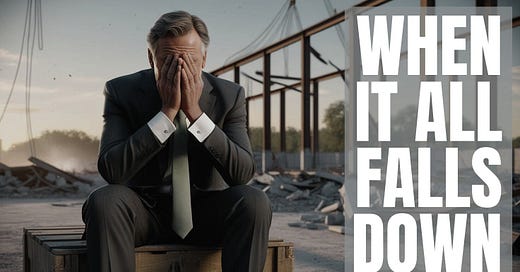When it all falls down
Are we too quick to judge and too quick to abandon those that have suffered a company collapse or insolvency?
The article you’re about to read is part essay; part confession. It is a story about how, amidst tragedy, I/we default all too easily to cliche. When a person dies, we immediately dig out the phrase “our thoughts are with their friends and family”. In the event of a company collapse, we dredge up the equally trite “our thoughts are with the employees and the supply chain”. In both instances, we have a strange tendency to overlook the primary victim; to shift our focus; and to look away too soon.
I hope this article goes some way toward setting the record straight.
In the fast-paced and often unpredictable world of demolition and construction, insolvency can strike unexpectedly. Many founders dedicate years to building their companies; risking personal assets, making personal sacrifices, working long hours, and investing their time, dedication and passion into every project. Yet, despite their efforts, unforeseen financial difficulties can lead to insolvency, a situation that feels like a profound personal failure. While industry discussions tend to focus on the legal and financial aspects, the emotional and psychological toll on founders is often overlooked, despite being equally devastating.
The moment a founder faces insolvency, a wave of emotions can wash over them. Fear, despair, guilt, and shame. According to research and industry insights, mental health issues like anxiety, depression, and panic attacks are common among those navigating these turbulent waters. Daniel Silverman, a mental health expert specialising in entrepreneurial stress, highlights that the sense of loss and helplessness can be overwhelming, akin to a bereavement.
Imagine pouring all of your energy into your business - your vision, your dreams - and then watching it dissolve due to factors beyond your control. This experience can shake the very foundation of a person’s self-worth. Many founders find themselves questioning their capabilities, haunted by doubts and "what-ifs."
Insolvency doesn’t just affect the bank accounts; its ripple effects extend into personal lives. The financial strain often results in tense, strained relationships with spouses or partners. Arguments over money; assumptions of betrayal, or feelings of inadequacy can create a chasm between loved ones. Children - perceptive and sensitive - may sense the tension but not understand its cause, leading to behavioural challenges or emotional distress. The household, once a place of safety and stability, can become a battleground of confusion and even grief.
Beyond immediate family, founders often find themselves isolated from their professional networks. Industry friends, mentors, or colleagues may distance themselves; either out of discomfort or uncertainty about how to offer help. Industry associations that once provided camaraderie and support might revoke memberships or exclude members who have failed. This sense of alienation can intensify feelings of isolation, shame and loneliness.
One of the barriers to recovery is the misconceptions surrounding insolvency. It is common to believe that insolvency indicates dishonesty; in particular, that directors misappropriated funds or deliberately sabotaged their companies. While fraudulent cases happen and deserve scrutiny, most insolvencies are the result of external shocks like market downturns, supply chain disruptions, or unforeseen expenses.
The stigmatisation of insolvency as a personal moral failing can trap founders in shame, preventing them from seeking help or starting anew. It’s crucial to understand that many of these failures are the result of circumstances outside their control. Recognising this helps to reframe the narrative, allowing founders to see their experience as merely a chapter, not the end of their story.
And here I am equally guilty. I have seen people I know, like, respect and admire suffer insolvency. I have advised them - as best I could - when the insolvency began. I have reported on the company’s demise - as fairly and even-handedly as I can - as the insolvency has progressed. And then? And then, nothing.
They’re no longer in the industry so I no longer have any reason to write about them. As much as I might have liked them, the main thing we had in common - our mutual presence in the demolition and construction industry - is no longer a tie that binds us. So, like the worst kind of fair-weather friend, I move on. And I am not alone.
A demolition or construction company founder or owner will have dedicated their life, their every waking hour to their business. They will have felt the loss of that company every bit as keenly as they might feel the loss of a loved one. And then, at that moment, when they needed the support of their peers the most, we abandon and ostracise them. That is to our collective and eternal shame.





